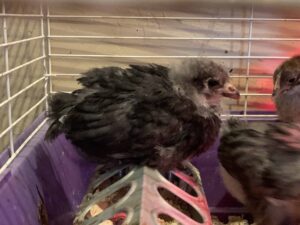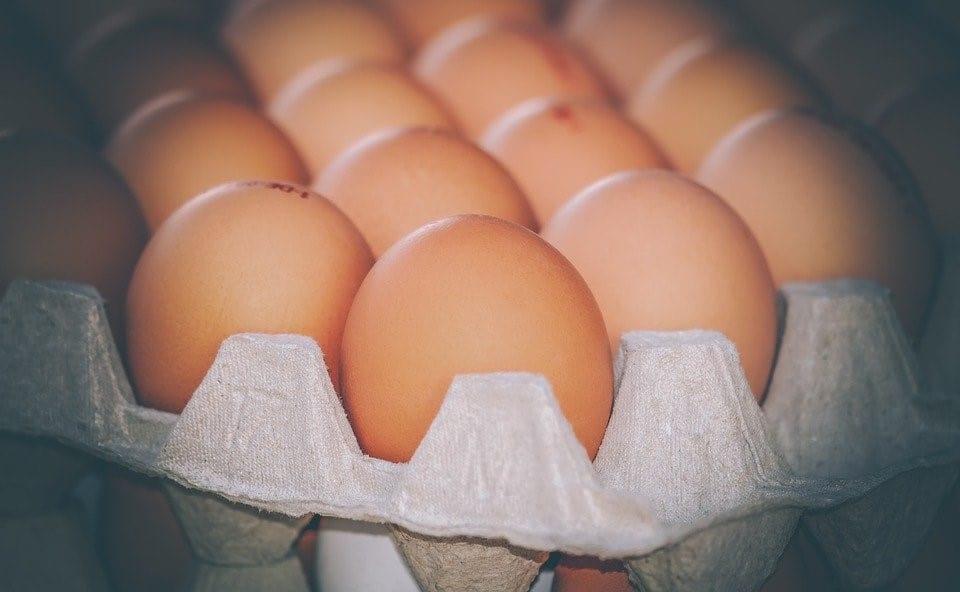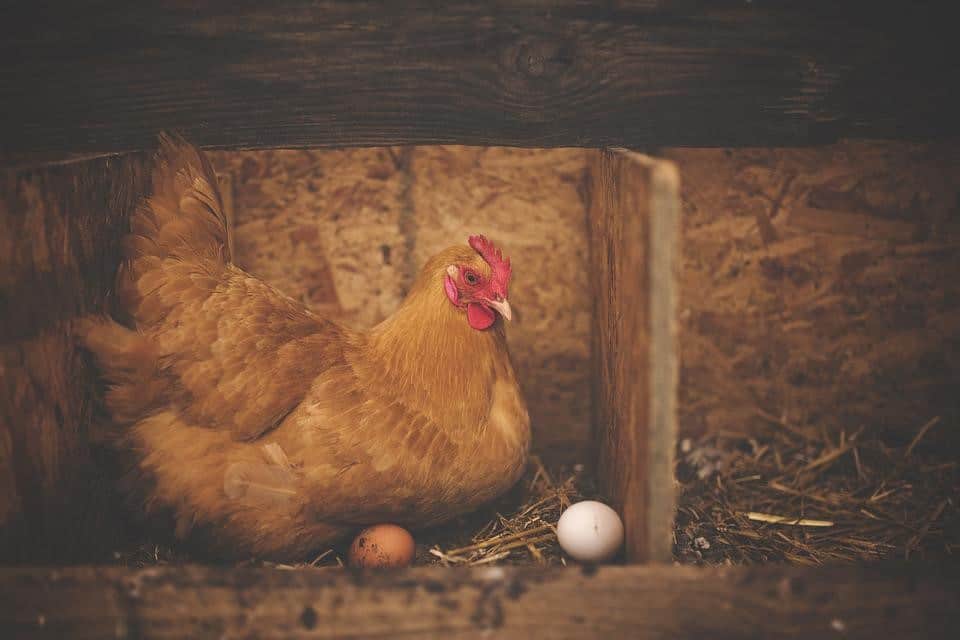Do chickens need a rooster to lay eggs? No, hens don’t need a rooster to lay eggs. Female chickens will lay regardless. However, hens need a rooster to lay fertile eggs. If you want to hatch chicks from the eggs, your chickens need a rooster.
If your goal in raising chickens is for eggs and/or meat, a rooster isn’t necessary. Without roosters, chickens lay unfertilized eggs.
While the answer is simple, many other factors come into play when deciding to keep a rooster with your hens. While he will protect his flock, keeping a rooster adds new factors to consider:
- The crowing may bother neighbors
- You need to have enough hens (8 – 10) for each rooster
- May be aggressive, depending on the breed
In addition, there may be ordinances in your area about keeping chickens and roosters.
Chickens do not need a rooster to start laying eggs. If you want to hatch chicks from the eggs, the eggs need to be fertilized. That’s when you need a rooster. Here’s what to know about chickens laying eggs with and without a rooster.
What Do Chickens Need to Lay Eggs
It is a natural process for female chickens to lay eggs. In their younger years, they will be most productive. Taking care of chickens is fairly straightforward. While hens don’t need a rooster, here is what chickens need to lay eggs and so they can be at their best:
Nutritious feed
Whether you are raising hens for eggs or meat, chickens need chicken feed. It is formulated to provide essential nutrients, including calcium and protein, for various stages of a chicken’s life. Even if your flock has the ability to free-range (which is fantastic!) provide several feeders with chicken feed.
- Starter feed: Rich in proteins and is for chicks up to 6 weeks old
- Grower feed: Given from 6 to 20 weeks; contains moderate protein levels
- Layer feed: For hens laying eggs; contains calcium for strong eggshells
Additionally, there are specialized feeds for broilers or meat chickens that promote faster growth.
Be sure to have enough chicken feeders so bossy hens don’t inhibit others from eating. The feeders should be easy to fill and clean. They should be setup so it’s easy for the hens to access but not spill. You also don’t want pests being able to access their food while it’s out for the chickens.
Be sure to store chicken feed in a secure container so pests don’t get it and so it’s not ruined by rain or snow. Store it in a dry place away from direct sunlight. Be sure to prevent mold.
Fresh, clean water
Providing access to clean water at all times is essential. Be sure to have several waterers to avoid competition. It’s best to have water sources that the chickens can’t step in. They should be easy to refill and clean.
Enough sunlight
Most breeds are most productive laying eggs when there are long hours of sunlight. This is why most breeds tend to lay fewer eggs or stop laying all together in the cold winter months. When there is less than 12 – 14 hours of sunlight a day, egg laying diminishes.
Allow your hens to have an area where they can be in the sun each day. They should not be stuck in their coops.
Enough space
Overcrowding chickens is unsanitary and will lead to stress and unhealthy conditions. At a minimum, each hen needs 3 – 4 square feet. Plan your coop accordingly.
Learn more: How much space do chickens need
Clean nesting boxes
Most backyard chickens will lay their eggs in nesting boxes. The exception to this is if they have a large area to free range. Then they may lay them everywhere (even on thick tree branches!).
Provide safe nesting boxes so they can lay without worry. Provide chicken bedding to make it comfortable for your hens to lay their eggs. Keep the nesting boxes clean.
Spacious, clean coop
Provide a chicken coop that is spacious and secure from predators and weather. It should be well-ventilated and also draft-free. Clean it regularly to keep chickens healthy.
Ability to forage and free range
Chickens will love having the ability to be in the sunshine and to forage for insects, slugs, snails, etc. This will supplement their diets naturally. (You still need to provide feeding stations for them.) If you have a garden, this can be a win for you as they will watch over your plants!
If daytime free-ranging isn’t an option, at a minimum, set up a chicken run for them to get exercise, mental stimulation, and fresh air. You may also want to consider some chicken toys and treats for chickens from time to time.
Learn more about chicken treats which can supplement their diets:
Have enough hens if you keep a rooster
You do not want your rooster to over-mate your hens. At a minimum, keep 6 – 8 hens per rooster. Keeping 8 – 10 hens is even better. Even if you have a larger flock, you may only want to keep one rooster.
Roosters like being in charge. Having more than one may create more stress as roosters fight for dominance.
Choose mild-mannered breeds
While each chicken will have it’s own personality, choosing an easy-going friendly chicken breeds will go a long way toward a harmonious flock.
Some breeds are known to be friendly such as Orpingtons, Cochin chickens, Rhode Island Reds, Wyandottes, Silkies, and Faverolles.
Even the largest chicken breed, the Jersey Giant, is non-aggressive despite it’s large size.
Whether you keep one type of chicken or combine several breeds, when you choose non-domineering, friendly chickens, there should be relative peace in your flock.
Watch pecking order
Chickens must feel safe in their environment. Regularly watch your chickens’ behavior to ensure no hens are being singled out and “bullied”. This is important as stress for food, water, getting pecked, and overall feeling threatened will limit egg production.
Also, if you add chicks to your flock, do so when they are older. Keep them away from aggressive hens.
Provide area for dust baths
Dust baths are important for chickens. They help them remove excess oils, dirt, and parasites. They use them to help keep clean and to relax.
To set up a dust bath area:
- Pick a sunny, dry spot in the yard.
- Dig a 4 inch deep pit.
- Combine a mixture of sand, fine dirt, and food-grade diatomaceous earth (DE) for natural insecticide properties.
- Regularly turn it, especially if it rains.
- Replenish mixture as needed.
Stress Free Environment So Hens Lay Eggs
Keeping your hens in a stress free environment is essential. In the chicken world, stress can come in many forms. Some stressors you can control are:
- Having at least 12+ hours a day of sunshine will promote egg laying
- Having enough hens per rooster so hens aren’t over-mated
- Keeping only mild-mannered, non-aggressive chicken breeds
- Only keep one rooster and no more
- Have enough nutritious food
- Provide clean, accessible water
- Have several chicken feeders, waterers, and nesting boxes to prevent the more aggressive hens from excluding others
- Protection from predators
- Protection from harsh climate
- Ability for chickens to stay warm and dry in wet, cold weather
- Keep coop clean; clean and replenish chicken bedding regularly
- Be sure coop is draft free and well-ventilated
- Enough space per chicken; avoid overcrowding
- Minimize competition for resources
- Provide opportunities for mental stimulation
- Allow them to free-range
There are certain breeds who lay more eggs than others by nature. Some of these best egg laying chickens are White Leghorns, Rhode Island Red, Golden Comet, and the California White chicken.
Do Chickens Lay Eggs Every Day?
No, chickens do not lay eggs everyday. Most breeds will lay 3 – 5 eggs a week in their most productive years. This will depend on the chicken breeds you raise. Some are considered prolific layers while some are moderate layers.
If you have a flock of chickens, you will likely be able to collect a few eggs each day. With a flock of 10 hens, this can mean 30 – 50 eggs a week. That’s up to 4 dozen eggs a week!
Keep in mind, most breeds lay more eggs in the spring and summer than in the late fall and winter. This is because as the days get shorter, hens lay less eggs. Sunlight stimulates egg production.
Also note, some chickens, like small Silkies, lay small eggs. Other chicken breeds, such as Jersey Giants, the Delaware chicken, Sussex chickens, and the Plymouth Rock chicken lay large eggs.
Do Chickens Need a Rooster to Lay Eggs
No, female chickens do not need a rooster to lay eggs. While numerous advantages come with keeping a rooster among your chicken flock, especially when they are of egg-laying age, the simple truth is that hens will lay eggs with or without a rooster in their chicken coop.
However, if you want your hens to lay fertilized eggs that can hatch into baby chicks, having a rooster on your farm is necessary.

What to Know About the Egg Laying Process
To fully understand why chickens don’t need a rooster to lay eggs, you first must understand the egg laying process.
A hen (female chicken) is ready to start laying eggs by the time they get to their 18th week for most breeds. Some breeds will lay sooner. However, the egg-laying process begins as soon as the chicken is born. Like most female beings, hens are born with a finite number of eggs. They begin laying these eggs when they are mature enough to do so—at around 4 months or 18 weeks.
Long before the eggs are laid, they are tiny little organisms within the chicken’s body known as ova or ovum (plural). These ova are stored inside follicles which are, in turn, held inside the hen’s ovary.
As the chicken matures, the ovum will slowly develop one by one. Once an ovum is developed, it turns into an egg yolk. At this point, it’s released by the hen’s ovary into its oviduct through ovulation.
It is in the oviduct where all the magic happens. Here, the eggs get their egg whites and shells in preparation for the egg laying process. It’s also here that it may or may not become a fertilized egg.
Once a hen is ready to start laying eggs, it can do so at least once every 24 hours, depending on the breed of chicken you have in your backyard flock. Some chicken breeds, such as the Cinnamon Queen chicken, are more prolific at egg laying than others.
As you can see, the egg laying process is entirely independent of a rooster, and hens can and do lay eggs with or without a rooster.
Learn more: How do chickens mate

How Often Can Chicken Lay Eggs
Even though this will depend on the chicken breed, most hens can lay at least one egg every 24 hours. However, as mentioned, every chicken has a finite number of eggs assigned to it at birth. This means that once they have laid all the eggs they can lay, there will be no more eggs for the chicken owner regardless of how much layer feed you feed your laying hens.
The good news is that, with proper management, a hen can lay up to 600 eggs in its lifetime. You will find that hens can lay at least once every day for two-thirds of the year, up until they run out of eggs.
To begin with, most chicken breeds will start by laying smaller and fewer eggs. The size and number of eggs will increase as the chicken matures into its egg-laying role. The numbers and size will slowly plummet as the hen gets older and nearer the end of her egg laying days.
When Do Hens Need Roosters
Since hens don’t need a rooster to lay eggs, you might wonder why roosters are necessary, considering how many rules and guidelines you must follow to keep them.
The simple truth is that roosters are necessary if you want fertilized eggs that can turn into little chicks or baby hens with the right management. While hens can lay eggs without a rooster being present, these will be unfertilized eggs. Despite being just as delicious, these eggs can’t turn into chicks and, as such, won’t help grow your flock.
Hens also can benefit from a rooster because he will protect the flock, helping to keep them safe from predators and to alert them to threats.

Reasons to Raise Chickens
If you keep chickens in your backyard, you have several options. You can:
- Keep them all as layers and farm them for their eggs
- Use the hens for meat when they stop laying
- Can keep chickens strictly for meat production
- Hatch fertile chicks with a rooster
You can eat unfertilized eggs, and you can eat fertilized eggs. So if your goal is to have eggs and raise chicks, you need a rooster.
If you are interested in keeping chickens for their eggs or as layers, here are some of the benefits that come with that:
You get eggs with or without a rooster:
Of course, this has to be the number one reason you want to keep layers. Not only is egg production a potentially lucrative business venture, but eggs are an excellent source of protein and sustainable food source for your family.
Hens lay eggs for a long time:
For several years, your backyard poultry could be providing you with fresh eggs. Each hen has the potential to give you up to 600 chicken eggs in its lifetime. Imagine how many eggs you could have if you put your chickens on a rotational basis.
You get meat:
As each bird ages, its egg production prowess slows down and eventually stops. At this point, this chicken will be mature enough to provide you with meat instead of eggs. Most chicken farmers who keep layers do so with the eventual plan of selling them off as meat once they are done laying eggs.
You can raise chicken breeds known for their meat instead of their eggs if you are interested in raising meat birds.
Learn more: Best meat chickens
Fertile eggs are profitable:
Some farmers have resorted to simply buying fertile eggs from farmers with roosters and hens in their flock. Fertilized chicken eggs tend to sell for more than typical eggs. You can also sell unfertilized eggs to neighbors and friends.
Reasons to Raise Roosters
Roosters provide protection:
Keeping a rooster among your hens means you will have a guard animal so to speak. A rooster will remain alert to threats, including predators and people.
Roosters fertilize eggs:
If you want to sell fertilized eggs and/or hatch baby chicks, you need a rooster. If you choose a chicken breed where the hens are broody, they will sit on their eggs and hatch them on their own. The other option is to use an incubator and incubate the eggs yourself.
Raising chicks means you will have a continuous source of eggs and possibly meat.
Even if you don’t want to hatch chicks
You can still eat the eggs even if they are fertilized by the rooster.
Learn the pros and cons to keeping a rooster and other important information about raising roosters before adding them to your flock.
Roosters provide meat
Roosters are male chickens. You can eat roosters just as you would the hens. Learn more: Can you eat roosters
As you can see, the benefits don’t end with getting an egg in the nest box every morning. There are a lot of benefits and that come with keeping backyard chickens, even if they are just layers. That, however, doesn’t mean that there aren’t a few drawbacks as well.
What Are the Disadvantages of Raising Chickens With Roosters?
Although you can get eggs in the nesting boxes every morning or sell your chicken for meat, especially the roosters, some disadvantages come with raising chickens. These include:
- Backyard chickens can be noisy: Chickens tend to be noisy. It’s not just the roosters, the noisiest of them all, but all chickens. Even when chickens lay eggs, they make quite a bit of noise, and this can be problematic when you have neighbors who aren’t chicken farmers. Learn the 5 reasons why roosters crow.
- Chickens stink: Chickens, especially when kept confined, can stink from their droppings. This is particularly true if you live in an area with lots of rain.
- Chickens can be expensive: When chickens stop being broody or laying eggs, they can become quite expensive to maintain. The sale of eggs and meat often offsets this cost. However, if you are particular about only keeping layers until they stop laying eggs, maintaining them can be quite expensive and not cost-effective.
- You need enough chickens: It is best to have 8 – 10 hens per rooster to keep the hens healthy.
Chickens attract predators, such as raccoons and skunks that are attracted to your backyard by the smell and sound of a chicken. The problem with this kind of problem is that it can quickly go past the backyard.
Such predators bring financial loss with them—should they attack and decimate your flock—and many also bring diseases. This can be of great concern, especially if small children like to play in the backyard.
Furthermore, from a legal standpoint, roosters are a sensitive topic in many states, such as Florida where you need a backyard chicken permit, New York, and California. These are places where chicken farmers are required to meet strict guidelines when it comes to keeping chickens and roosters in particular.
Can Chickens Lay Eggs Without a Rooster ~ Yes!
Do chickens need a rooster to lay eggs? No, they don’t. However, hens need roosters to lay fertilized eggs that can lead to baby chicks and the growth of your flock. If you aren’t interested in hatching chicks, you don’t need to keep a rooster. Your hens will lay eggs without them.
Learn more:

